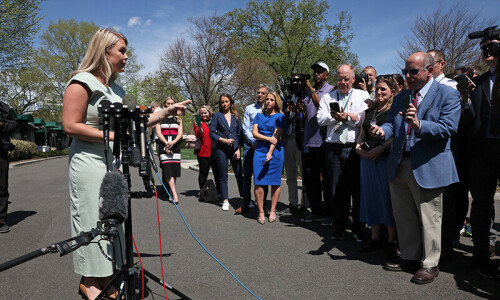Poverty eradication uphill task for Pakistan, India: World Bank
WASHINGTON: Statistics released by the World Bank this week show that both India and Pakistan face an uphill task in eradicating poverty, despite Indian Prime Minister Narendra Modi’s claim that Islamabad needs to learn from New Delhi how to fight poverty.
The World Bank report — “Poverty and Shared Prosperity” — places Pakistan among the countries where incomes of the poorest are growing faster than average. The poorest in Pakistan are slightly ahead of the four per cent national growth rate while China tops the list with a more than 8pc growth rate. Sri Lanka is also in this category.
India is placed among the countries where incomes of the poorest are growing slower than average, although it has one of the world’s fastest growing economies.
Editorial: Poverty in nuclear South Asia
Overall, the statistics show that while in some fields India is doing better than Pakistan, in others Pakistan is ahead.
The data shows that as many as 21.25pc Indians live at or below the World Bank’s poverty line of $1.90 a day compared to 8.3pc in Pakistan.
And 58pc Indians make $3.10 a day, compared to 45pc in Pakistan.
Although the bank hopes that Bangladesh can overcome its poverty by 2030 if it continued its robust economic reforms, the statistics show that 43.7pc Bangladeshis continue to live at or below $1.90 while 77.6pc live at $3.10 a day.
Life expectancy
India fares marginally better than Pakistan in life expectancy, which was 68 years in India and 66.1 years in Pakistan in 2014. India has an edge in life expectancy for women too, 69.49 years versus 67.15 years for Pakistan.
India, however, has a clear edge in adult female literacy with 59.2pc in 2011, while for Pakistan it was 41.9pc.
Infant mortality in India declined from 46.3 per 1000 live births in 2010 to 37.9 in 2015, while for Pakistan the comparable figures are 73.5 in 2010 and 65.8 in 2015. This gives a clear advantage to India.
India is better in dealing with undernourishment as well, with 15.2pc of its population undernourished in 2015, compared to 22 per cent in Pakistan.
The World Bank report shows that during 2007 and 2013, Pakistan’s annualised growth in mean consumption for the bottom 40pc was 2.81pc, compared to 2.53pc for the total population.
The mean consumption or income per capita, (US dollar per person) for the bottom 40pc was 2.07pc as compared to 3.81pc for the total population.
The data for most recent year shows the annualised growth rate for the bottom 40pc at 2.44pc while it was 4.42pc for the total population.
The data also shows that increased schooling has led to more productive nonfarm activities in Pakistan.
Similarly, conditioning cash support to low income families to children’s regular school attendance at school, led to large increases in enrolment (between 11 to 13pc) in Pakistan.
Pakistan is also among the countries where the World Bank study noticed a shift toward declining inequality between 2008 and 2013. In Pakistan, the Gini index, which measures inequality, fell by −2.4 points.
Published in Dawn, October 4th, 2016














































